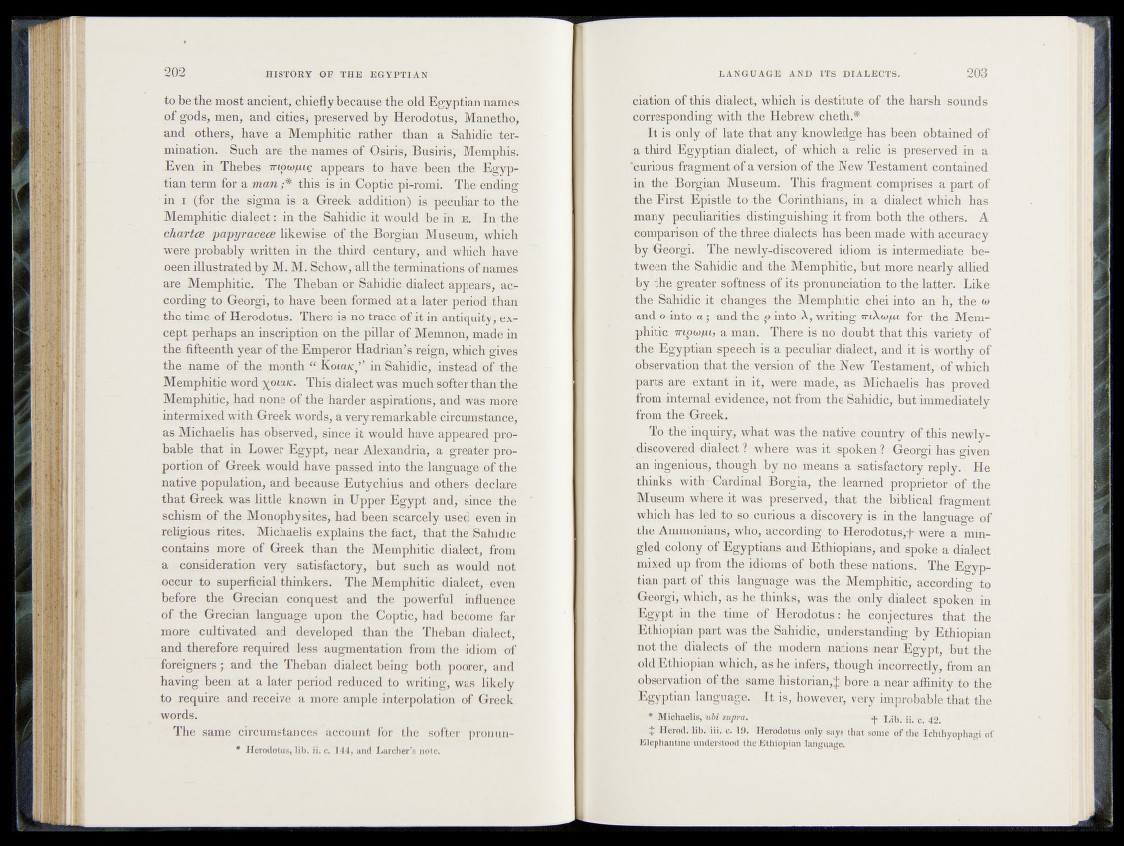
to be the most ancient, chiefly because the old Egyptian names
of gods, men, and cities* preserved by Herodotus, Manetho,
and others, have a Memphitic rather than a Sahidic termination.
Such are the names of Osiris, Busiris, Memphis.
Even in Thebes Triples appears to have been the Egyptian
term for a man ;* this is in Coptic pi-romi. The ending
in i (for the sigma is a Greek addition) iss peculiar to the
Memphitic dialectr in the Sahidic it would be in e . In the
charted papyracece likewise -of the Borgian Museum, which
were probably written in the third century, and which have
neen illustrated by M. M. Schow, all the terminations of names
are Memphitic. The Theban or Sahidic dialect appears, a o
cording to Georgi, to have been formed at a later?period than
the time of' Herodotus. There is no trace of it in antiquity, except
perhaps an inscription on the pillar of Memnon, made in
the fifteenth year of the Emperor Hadrian’s reign, which gives
the name of the month “ Kota*,’’ in Sahidic, instead of .the
Memphitic word xolaK• This dialect was much softer than the
Memphitic, had none of the harder aspirations, and was more
intermixed with Greek words, a veryremarkable circumstance,
as Michaelis has observed, since it would have appeared probable
that in Lower Egypt, near Alexandria, a greater p#*-
portion of Greek would have passed into the language of the
native population, and because Eutychius and others declare
that Greek was little known in Upper Egypt and, since the
schism of the Monophysites, had been scarcely used even in
religious rites. Michaelis explains the fact, that the Sahidic
contains more of Greek than the Memphitic dialect, from
a consideration very satisfactory, but such as would not
-occur to superficial thinkers. The Memphitic dialect, even
before the Grecian conquest and the powerful influence
of the Grecian language upon the Coptic, had become far
more cultivated and developed than the Theban dialect,
and therefore required less augmentation from the idiom of
foreigners; and the Theban dialect being both poorer, and
having been at a later period reduced to writing, was likely
to require and receive a more ample interpolation of Greek
words.
The same circumstances account for the softer pronun-
* Herodotus, lib. ii. c. 144, and Lurcher’s note.
ciation of this dialect, which is destitute of the harsh sounds
corresponding with .the Hebrew chcth.#
It isvdnly of late that any knowledge has been obtained of
a third Egyptian dialect, of which a relic is preserved in a
"curious fragment of a version of the New Testament contained
in’ the Borgian Museum. This fragment comprises a part of
the First Epistle tdsthe,. Corinthians, in a dialect which has
many peculiarities?distinguishing it from both the others. A
comparison of the three dialects has been made with accuracy
by Georgi. The newly-discovered idiom is intermediate between
the Sahidic and the Memphitic, but more nearly allied
-by the greater softness of its pronunciation to the fetter. Like
the Sahidic it changes the Memphitic chei into an h, the
and o into a ; and the p into A, writing iriXtofu for the Memphitic
Trtjpwnh a man. There is no doubt that this variety of
theiEgyptian speechfe a peculiar diadeet, and'it is- worthy of
observation that the version of the New Testament, of which
parts are extant in it, were made, as Michaelis has proved
from internal evidence, not from the Sahidic, but immediately
from the Greek.
To the inquiry, what was the native country of this newly-
discovered dialect ? where was it spoken ? Geoigi has given
an ingenious, though by no means a satisfactory reply. He
thinks withrCardinal Borgia, the learned proprietor ofthe
Museum where it was preserved, that the biblical fragment
which-has led to so curious a discovery is in the language of
the Ammonians, who, according to Herodotus^ were a mingled
colony of Egyptians and Ethiopians, and spoke a dialect
mixed up from the idioms of both these nations. The Egyptian
part of this language was the Memphitic, according to
Georgi, which, as he thinks, was the only dialect spoken in
Egypt in the time of Herodotus: he conjectures that the
Ethiopian part was the Sahidic, understanding by Ethiopian
not the dialects of the modern nations near Egypt,. but the
old Ethiopian which, as he infers, though incorrectly, from an
observation of the same historian,^; bore a near affinity to the
Egyptian language. It is, however, very improbable that the
* Michaelis, ubi supra. Lib. ii.‘c; 42.
£ Herod. lib.Sii. ie. 19. Herodoitusonly says that some of the Ichthyophagi of
Elephantine understood the Ethiopian language.